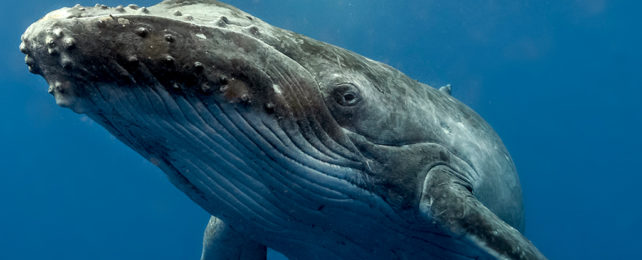Our addiction to online shopping is contributing to the recent spike in whale deaths, The New York Times reports.
Since early December, 23 whales have washed up dead along the East Coast, according to data the National Oceanic and Atmospheric Administration provided to The Times. Their deaths are due to a confluence of factors, both environmental and the result of human interference.
NOAA has been tracking an "unusual mortality event" among the Atlantic Coast humpback whale population since 2016, but the recent spike in whale deaths – which has included humpback whales, minke whales, and North Atlantic right whales, which are critically endangered – prompted the NOAA Fisheries to address the crisis during a call with reporters in January.
Lauren Gaches, the agency's public affairs director, said during the call that climate change is partly to blame for the number of whales washing up dead, because warming oceans are causing the fish they eat to move closer to shore.
"We're seeing populations of many marine species adapting by moving into new areas where conditions are more favorable," Gaches said.
"Changing distributions of prey impact larger marine species that depend on them. This can lead to increased interactions with humans as some whales move closer to near-shore habitats."
Which means as some whales seek out prey, they're moving into the path of cargo ships, which have gotten bigger and more plentiful over the past three years.
Boat strikes can be deadly for whale populations all over the world
The surge in online shopping that began during the pandemic has led to an increase in cargo ships hauling those goods across the Atlantic to the busy Port of New York and New Jersey.
Those ships, larger than they were in the past in order to carry more shipping containers, are also taking new routes in an effort to avoid clogging up shipping lanes like in years past, according to The Times.
The Port Authority of New York and New Jersey saw a 27 percent increase in volume last year compared to 2019 levels, and shipping traffic along the East Coast has increased as boats have started making down-and-back trips to retrieve empty shipping containers.
While NOAA has proposed speed limits, which could give whales time to move out of the way of oncoming ships, the fact remains that whales are always going to follow their food.
"When the whales are in these channels, you have to cross your fingers and hope there are no collisions," Paul Sieswerda, executive director of New York City-based research group Gotham Whale, told The Times.
Boat strikes can cause internal injuries from the blunt force trauma, and their propellers can inflict large gashes. Two whales that washed up dead along the Atlantic Coast this month were determined to have been struck by vessels, USA Today reported.
This isn't the first time experts have raised the alarm about ships harming whale populations. A year ago, scientists began calling for cargo ships to start rerouting in order to protect endangered blue whales that live off the coast of Sri Lanka.
Mediterranean Shipping Company, the largest container line in the world, complied with the request, and animal welfare groups said at the time that if other companies followed, it could reduce ship strikes by 95 percent.
This article was originally published by Business Insider.
More from Business Insider: